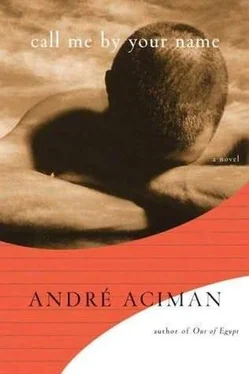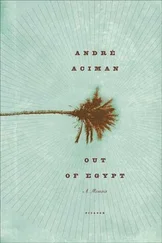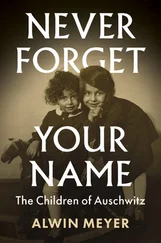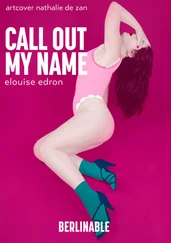André Aciman - Call Me by Your Name
Здесь есть возможность читать онлайн «André Aciman - Call Me by Your Name» весь текст электронной книги совершенно бесплатно (целиком полную версию без сокращений). В некоторых случаях можно слушать аудио, скачать через торрент в формате fb2 и присутствует краткое содержание. Год выпуска: 2007, Издательство: Farrar, Straus and Giroux, Жанр: Современная проза, на английском языке. Описание произведения, (предисловие) а так же отзывы посетителей доступны на портале библиотеки ЛибКат.
- Название:Call Me by Your Name
- Автор:
- Издательство:Farrar, Straus and Giroux
- Жанр:
- Год:2007
- ISBN:нет данных
- Рейтинг книги:5 / 5. Голосов: 6
-
Избранное:Добавить в избранное
- Отзывы:
-
Ваша оценка:
- 100
- 1
- 2
- 3
- 4
- 5
Call Me by Your Name: краткое содержание, описание и аннотация
Предлагаем к чтению аннотацию, описание, краткое содержание или предисловие (зависит от того, что написал сам автор книги «Call Me by Your Name»). Если вы не нашли необходимую информацию о книге — напишите в комментариях, мы постараемся отыскать её.
is clear-eyed, bare-knuckled, and ultimately unforgettable.
Call Me by Your Name — читать онлайн бесплатно полную книгу (весь текст) целиком
Ниже представлен текст книги, разбитый по страницам. Система сохранения места последней прочитанной страницы, позволяет с удобством читать онлайн бесплатно книгу «Call Me by Your Name», без необходимости каждый раз заново искать на чём Вы остановились. Поставьте закладку, и сможете в любой момент перейти на страницу, на которой закончили чтение.
Интервал:
Закладка:
“Look, we can’t talk about such things. We really can’t.”
He slung his bag around him and we were off downhill.
Fifteen minutes ago, I was in total agony, every nerve ending, every emotion bruised, trampled, crushed as in Mafalda’s mortar, all of it pulverized till you couldn’t tell fear from anger from the merest trickle of desire. But at that time there was something to look forward to. Now that we had laid our cards on the table, the secrecy, the shame were gone, but with them so was that dash of unspoken hope that had kept everything alive these weeks.
Only the scenery and the weather could buoy my spirits now. As would the ride together on the empty country road, which was entirely ours at this time of day and where the sun started pounding exposed patches along the route. I told him to follow me, I’d show him a spot most tourists and strangers had never seen.
“If you have time,” I added, not wishing to be pushy this time.
“I have time.” It was spoken with a noncommittal lilt in his voice, as though he had found the overplayed tact in my words slightly comical. But perhaps this was a small concession to make up for not discussing the matter at hand.
We veered off the main road and headed toward the edge of the cliff.
“This,” I said by way of a preface meant to keep his interest alive, “is the spot where Monet came to paint.”
Tiny, stunted palm trees and gnarled olive trees studded the copse. Then through the trees, on an incline leading toward the very edge of the cliff, was a knoll partly shaded by tall marine pines. I leaned my bike against one of the trees, he did the same, and I showed him the way up to the berm. “Now take a look,” I said, extremely pleased, as if revealing something more eloquent than anything I might say in my favor.
A soundless, quiet cove stood straight below us. Not a sign of civilization anywhere, no home, no jetty, no fishing boats. Farther out, as always, was the belfry of San Giacomo, and, if you strained your eyes, the outline of N., and farther still was something that looked like our house and the adjoining villas, the one where Vimini lived, and the Moreschi family’s, with their two daughters whom Oliver had probably slept with, alone or together, who knew, who cared at this point.
“This is my spot. All mine. I come here to read. I can’t tell you the number of books I’ve read here.”
“Do you like being alone?” he asked.
“No. No one likes being alone. But I’ve learned how to live with it.”
“Are you always so very wise?” he asked. Was he about to adopt a condescending, pre-lecture tone before joining everyone else on my needing to get out more, make more friends, and, having made friends, not to be so selfish with them? Or was this a preamble to his role as shrink/part-time-friend-of-the-family? Or was I yet again misreading him completely?
“I’m not wise at all. I told you, I know nothing. I know books, and I know how to string words together — it doesn’t mean I know how to speak about the things that matter most to me.”
“But you’re doing it now — in a way.”
“Yes, in a way — that’s how I always say things: in a way.”
Staring out at the offing so as not to look at him, I sat down on the grass and noticed he was crouching a few yards away from me on the tips of his toes, as though he would any moment now spring to his feet and go back to where we’d left our bicycles.
It never occurred to me that I had brought him here not just to show him my little world, but to ask my little world to let him in, so that the place where I came to be alone on summer afternoons would get to know him, judge him, see if he fitted in, take him in, so that I might come back here and remember. Here I would come to escape the known world and seek another of my own invention; I was basically introducing him to my launchpad. All I had to do was list the works I’d read here and he’d know all the places I’d traveled to.
“I like the way you say things. Why are you always putting yourself down?”
I shrugged my shoulders. Was he criticizing me for criticizing myself?
“I don’t know. So you won’t, I suppose.”
“Are you so scared of what others think?”
I shook my head. But I didn’t know the answer. Or perhaps the answer was so obvious that I didn’t have to answer. It was moments such as these that left me feeling so vulnerable, so naked. Push me, make me nervous, and, unless I push you back, you’ve already found me out. No, I had nothing to say in reply. But I wasn’t moving either. My impulse was to let him ride home by himself. I’d be home in time for lunch.
He was waiting for me to say something. He was staring at me.
This, I think, is the first time I dared myself to stare back at him. Usually, I’d cast a glance and then look away — look away because I didn’t want to swim in the lovely, clear pool of his eyes unless I’d been invited to — and I never waited long enough to know whether I was even wanted there; look away because I was too scared to stare anyone back; look away because I didn’t want to give anything away; look away because I couldn’t acknowledge how much he mattered. Look away because that steely gaze of his always reminded me of how tall he stood and how far below him I ranked. Now, in the silence of the moment, I stared back, not to defy him, or to show I wasn’t shy any longer, but to surrender, to tell him this is who I am, this is who you are, this is what I want, there is nothing but truth between us now, and where there’s truth there are no barriers, no shifty glances, and if nothing comes of this, let it never be said that either of us was unaware of what might happen. I hadn’t a hope left. And maybe I stared back because there wasn’t a thing to lose now. I stared back with the all-knowing, I-dare-you-to-kiss-me gaze of someone who both challenges and flees with one and the same gesture.
“You’re making things very difficult for me.”
Was he by any chance referring to our staring?
I didn’t back down. Neither did he. Yes, he was referring to our staring.
“Why am I making things difficult?”
My heart was beating too fast for me to speak coherently. I wasn’t even ashamed of showing how flushed I was. So let him know, let him.
“Because it would be very wrong.”
“Would?” I asked.
Was there a ray of hope, then?
He sat down on the grass, then lay down on his back, his arms under his head, as he stared at the sky.
“Yes, would . I’m not going to pretend this hasn’t crossed my mind.”
“I’d be the last to know.”
“Well, it has. There! What did you think was going on?”
“Going on?” I fumbled by way of a question. “Nothing.” I thought about it some more. “Nothing,” I repeated, as if what I was vaguely beginning to get a hint of was so amorphous that it could just as easily be shoved away by my repeated “nothing” and thereby fill the unbearable gaps of silence. “Nothing.”
“I see,” he finally said. “You’ve got it wrong, my friend”—chiding condescension in his voice. “If it makes you feel any better, I have to hold back. It’s time you learned too.”
“The best I can do is pretend I don’t care.”
“That much we’ve known for a while already,” he snapped right away.
I was crushed. All these times when I thought I was slighting him by showing how easy it was to ignore him in the garden, on the balcony, at the beach, he had been seeing right through me and taken my move for the peevish, textbook gambit it was.
His admission, which seemed to open up all the sluiceways between us, was precisely what drowned my budding hopes. Where would we go from here? What was there to add? And what would happen the next time we pretended not to speak but were no longer sure the frost between us was still sham?
Читать дальшеИнтервал:
Закладка:
Похожие книги на «Call Me by Your Name»
Представляем Вашему вниманию похожие книги на «Call Me by Your Name» списком для выбора. Мы отобрали схожую по названию и смыслу литературу в надежде предоставить читателям больше вариантов отыскать новые, интересные, ещё непрочитанные произведения.
Обсуждение, отзывы о книге «Call Me by Your Name» и просто собственные мнения читателей. Оставьте ваши комментарии, напишите, что Вы думаете о произведении, его смысле или главных героях. Укажите что конкретно понравилось, а что нет, и почему Вы так считаете.









